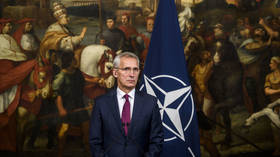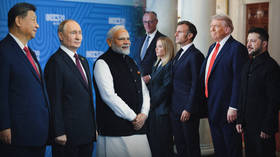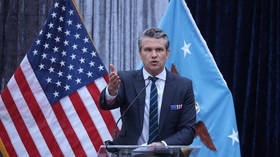‘Unreal strength’: Eurovision star Manizha does not ‘shame our country and undermine Russian women’, insists ice icon Slutskaya

Russian Eurovision entrant Manizha's inimitable performance of her controversial song about Russian women had at least one supporter on Saturday – figure skating legend Irina Slutskaya, who called on the country to back the star.
Known for her activism and concerts railing against prejudice, xenophobia and media-imposed beauty ideals, art-pop singer Manizha represented Russia at the finals in Rotterdam on Saturday night with a bombastic costume and stage show after winning almost 40 percent of the vote to sing for her nation at a vote in Moscow in March.
The 29-year-old has described the song, 'Russian Women', as an ode to "a woman's self-awareness over the past few centuries in Russia," charting the "amazing" path of females from "a peasant hut to the right to elect and be elected... from factory workshops to space flights."
"She has never been afraid to resist stereotypes and take responsibilities," she added. "This is the source of inspiration for the song."
Everyone needs to know this is MANIZHA! #Eurovision#OpenUp#Russiapic.twitter.com/oEwTsURaNH
— Eurovision Song Contest (@Eurovision) May 22, 2021
Manizha is a Tajik refugee, LGBTQ+ and women’s rights advocate, advocate against domesfic violence and UN Goodwill Ambassador for refugees. She’s an absolute icon. #Eurovision#OpenUp#RUSpic.twitter.com/Wb9V2wE5Kk
— Lara 🇮🇹🇱🇹🇲🇹🇨🇾🇧🇪🇺🇦🇸🇪 (@ilcuoredilara) May 22, 2021
The single met a mixed reception, including high-profile calls for Manizha to be banned from the finals because of the work's lack of cultural value. On social media, she received messages of hate from correspondents offended by the number.
Before she took to the stage to be watched by millions around the world, though, Russia's hopeful received the backing of two-time world champion Slutskaya, who admitted that she had experienced some confusion on first sight of the idea.
"Then I watched it a couple more times," said the seven-time European ice queen. "This is definitely something that has never happened before.
Manizha’s dress is made from fabrics donated to her by Russian women from every region in Russia 🤩 #Eurovision#OpenUp#RUSpic.twitter.com/Q9VYnppFv5
— Lara 🇮🇹🇱🇹🇲🇹🇨🇾🇧🇪🇺🇦🇸🇪 (@ilcuoredilara) May 22, 2021
Manizha is now singing to a wall of Russian women, telling them that they are strong enough and they can break the wall ❤️ #Eurovision#OpenUp#RUSpic.twitter.com/1ev7vDU7Sv
— Lara 🇮🇹🇱🇹🇲🇹🇨🇾🇧🇪🇺🇦🇸🇪 (@ilcuoredilara) May 22, 2021
"Yes, shocking. Yes, it does not fit into the usual understanding of what, in my opinion, a number for Eurovision should be. But maybe this is not bad?
"Many people write that the meaning of the song shames our country and undermines the authority of Russian women.
"But it seems to me that if you listen carefully, then she, rather, ridicules the stereotypes that haunt us throughout life and just sings about the unreal strength and power of a Russian woman."
Ok im in love with everything of this song , she is brilliant , so entertaining , catchy beats and so happy she sang on her own language !!! #Eurovision#Eurovision2021
— Ala (@jassemi) May 22, 2021
Born in Tajikistan, Manizha's family later moved to Moscow, including her father, who is said to have felt that singing was not a suitable career choice for a Muslim woman.
She studied gospel singing in New York and London and released her debut solo album, 'Womanizha', in 2019.
"Every woman has a right to represent her country the way she is," the former psychology student said shortly before her big moment.
wtf I want Russia to win now? this is amazing. really reminds me of Israel's entry from 2018.
— Anna (@catapprieciator) May 22, 2021
Didn’t understand a word , but totally got the performance and passion
— Claret&Blue (@Case8all) May 22, 2021
"Not adapting her skin or hair colour, religion or beliefs, political or social views.
"We are all different in Russia. In the world, too. And diversity is a strength when you accept it and display it.
"You will look closer at the beautiful women that sang with me on the Eurovision stage.
Winner aleeeeert!!!!! 😍😍😍😍🤩🤩🤩🤩
— Willo 🦊 (@wilcarma_) May 22, 2021
What a queen! I love this. Incredible performance and everything we want at Eurovision.
— Speaking of Influence podcast (@JohnABall) May 22, 2021
"Their differences and their common strength – it will be growing with many more amazing women of Russia."
Eurovision fans on social media seemed unanimous in their enthusiasm after she took her shot at glory, wearing a huge, colorful gown made from fabrics donated by women from every region in Russia and, at one point, backed by a wall of women from her homeland.
"What a queen," wrote one admirer. "I love this. Incredible performance and everything we want at Eurovision."
The 🪄Magic of Music 🎶 happens when you don’t understand a word 🇷🇺 of a song… but you feel its “Force” and meaning. Great performance, Russia🇷🇺!! 👏🏿👏🏿👏🏿 #EurovisionRTVE
— Carla Belén (@Carla_BelEn_GS) May 22, 2021
manizha already did so much by including in her video russian woc, ethnic minorities, political prisoners, transwomen etc and this little gesture of her kneeling down before RUSSIAN WOMEN WAS SUCH A POWERFUL MOMENT #Eurovision#FreePalestinepic.twitter.com/GSKpHa6jxm
— alice (@s4l1c3nc3) May 22, 2021
Another gushed: "Didn’t understand a word but totally got the performance and passion."
Slutskaya implored Russians to back her. "Bullying is always bad," she pointed out. "And what fell on Manizha in social networks is categorically wrong.
"On the contrary, we must support the participant from our country. She was elected by popular vote. I think the less anger and bile we have and the more ability to accept different points of view, the better."
Also on rt.com Rising Roman: Chelsea owner Abramovich adds more than $2BN to his vast wealth as midfielder Kante joins him on annual UK rich list













